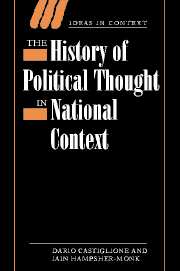Book contents
- Frontmatter
- Contents
- List of contributors
- Preface
- 1 Introduction The history of political thought and the national discourses of politics
- 2 The voice of the ‘Greeks’ in the conversation of mankind
- 3 History of political theory in the Federal Republic of Germany: strange death and slow recovery
- 4 A German version of the ‘linguistic turn’: Reinhart Koselleck and the history of political and social concepts (Begriffsgeschichte)
- 5 One hundred years of the history of political thought in Italy
- 6 Discordant voices: American histories of political thought
- 7 The professoriate of political thought in England since 1914: a tale of three chairs
- 8 The history of political thought and the political history of thought
- 9 The rise of, challenge to and prospects for a Collingwoodian approach to the history of political thought
- 10 Towards a philosophical history of the political
- 11 ‘Le retour des émigrés’? The study of the history of political ideas in contemporary France
- 12 National political cultures and regime changes in Eastern and Central Europe
- 13 The limits of the national paradigm in the study of political thought: the case of Karl Popper and Central European cosmopolitanism
- 14 Postscript. Disciplines, canons and publics: the history of ‘the history of political thought’ in comparative perspective
- Index
- IDEAS IN CONTEXT
4 - A German version of the ‘linguistic turn’: Reinhart Koselleck and the history of political and social concepts (Begriffsgeschichte)
Published online by Cambridge University Press: 23 September 2009
- Frontmatter
- Contents
- List of contributors
- Preface
- 1 Introduction The history of political thought and the national discourses of politics
- 2 The voice of the ‘Greeks’ in the conversation of mankind
- 3 History of political theory in the Federal Republic of Germany: strange death and slow recovery
- 4 A German version of the ‘linguistic turn’: Reinhart Koselleck and the history of political and social concepts (Begriffsgeschichte)
- 5 One hundred years of the history of political thought in Italy
- 6 Discordant voices: American histories of political thought
- 7 The professoriate of political thought in England since 1914: a tale of three chairs
- 8 The history of political thought and the political history of thought
- 9 The rise of, challenge to and prospects for a Collingwoodian approach to the history of political thought
- 10 Towards a philosophical history of the political
- 11 ‘Le retour des émigrés’? The study of the history of political ideas in contemporary France
- 12 National political cultures and regime changes in Eastern and Central Europe
- 13 The limits of the national paradigm in the study of political thought: the case of Karl Popper and Central European cosmopolitanism
- 14 Postscript. Disciplines, canons and publics: the history of ‘the history of political thought’ in comparative perspective
- Index
- IDEAS IN CONTEXT
Summary
Peter Burke has established three main approaches to the history of ideas, each of them dominant in a different language area. ‘In Germany there is Begriffsgeschichte, a “history of concepts” on the border between the history of language and the history of society.’ Within this German style, there are significant variations in how this relationship between the histories of concepts and societies has been perceived and practised. Although these differences will be discussed briefly, my concern here will be primarily with that theory of Begriffsgeschichte developed by Reinhart Koselleck in his writing on historiography, the theory of historical knowledge (Historik) and the history of concepts. His programme has been applied by himself and many other contributors in more than 7,000 pages of the great lexicon, Geschichtliche Grundbegriffe (GG), which he guided to completion after the deaths of its two other editors.
This chapter will centre on the relationship of Koselleck's theory and practice of conceptual history to current controversies about language, meaning and the interpretation of texts. After having spread from literary criticism and philosophy to historiography and intellectual history, these disagreements are now moving on to centre stage in discussions of how the history of political thought ought to be written. It is thus worth considering the implications of the history of political language as treated in this German version of the ‘linguistic turn’. Unlike French theory, whether in its structuralist, post-structuralist or deconstructionist variants, the principal challenge from German sources to Begriffsgeschichte in Koselleck's style has been posed by what he has called the ‘radical hermeneutics’ of Heidegger and Gadamer. His complex relationship to them needs explication.
- Type
- Chapter
- Information
- The History of Political Thought in National Context , pp. 58 - 79Publisher: Cambridge University PressPrint publication year: 2001
- 3
- Cited by



